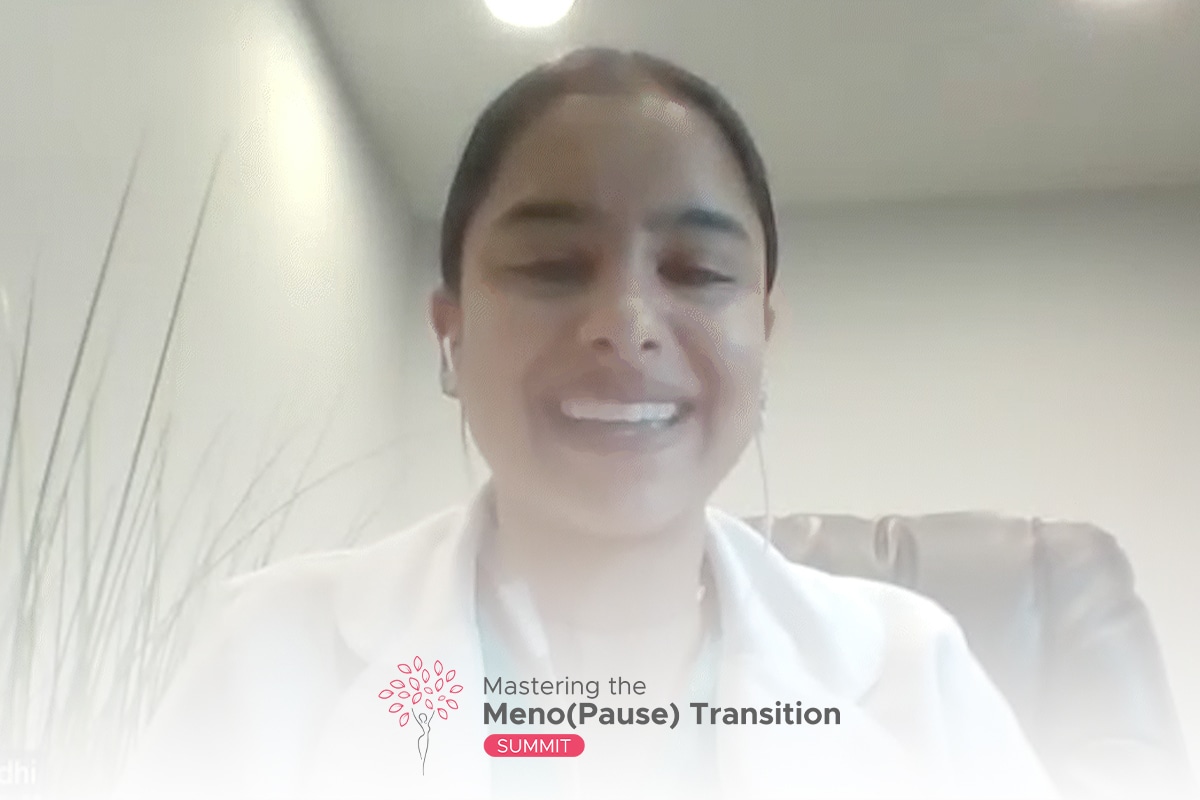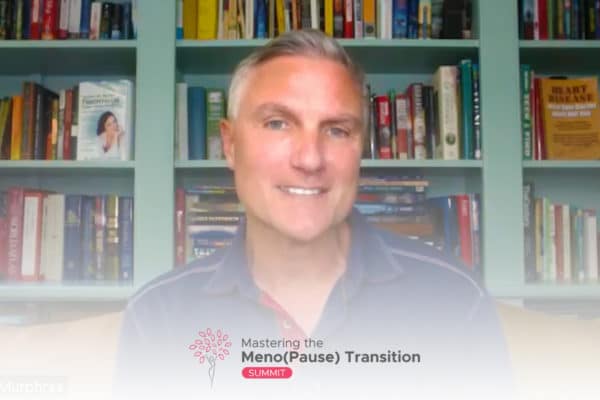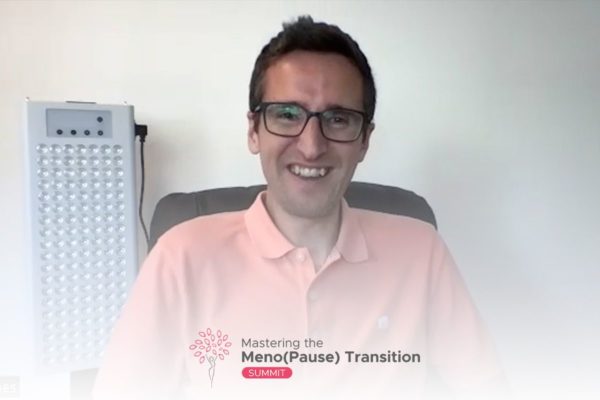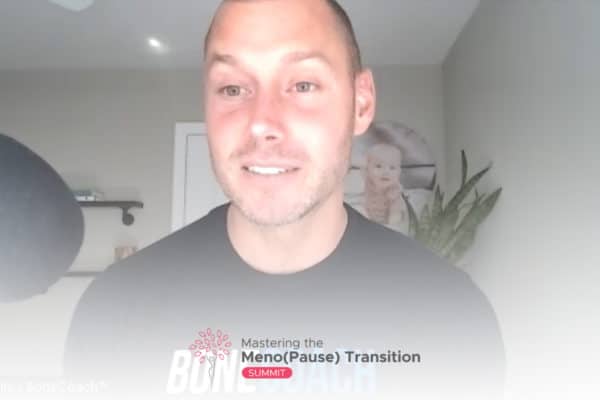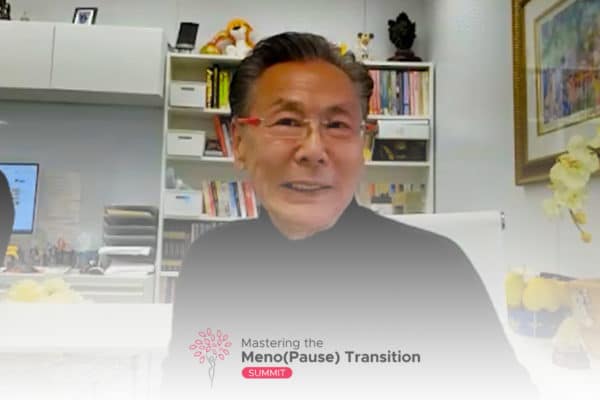Join the discussion below

Dr. Sharon Stills, a licensed Naturopathic Medical Doctor with over two decades of dedicated service in transforming women’s health has been a guiding light for perimenopausal and menopausal women, empowering them to reinvent, explore, and rediscover their vitality and zest for life. Her pioneering RED Hot Sexy Meno(pause) Program encapsulates... Read More

Dr. Bindiya Gandhi is double boarded by the American Board Family Medicine as well as the American Board of Integrative and Holistic Physicians. She is leading expert on leptin, weight loss resistance and hormone balance! Her interests include integrative, holistic and functional medicine, women’s health, preventative medicine, international medicine and... Read More
- What is leptin?
- Why we need to pay attention to leptin
- Why starving ourselves isn’t the answer
Dr. Sharon Stills
Hi, everyone. Welcome back to Mastering the Meno(Pause) summit. I am– the Mastering the Meno(Pause) transition summit. We have had lots of transitions here this morning. We’ve been having lots of tech issues, but we have worked it out and we’re gonna have a powerhouse half hour with my guest, Dr. Bindiya Gandhi. We are gonna talk about everything leptin. She’s a double-boarded by the American Board Family Medicine physician, as well as the American Board of Integrative and Holistic physician. She’s a leading expert on leptin. And you might be thinking, “What is leptin?” It’s something you need to know about, so I’m glad you’re here. And we are gonna dive in ’cause we have 30 minutes to bring this very important topic to you. And I didn’t introduce myself, but you all know me by now. I’m Dr. Sharon Stills. I’m your host. Welcome to the summit, Bindiya. It’s so great that you’re here.
Dr. Bindiya Gandhi
Thank you, Dr. Stills, for having me today.
Dr. Sharon Stills
Oh, you’re so welcome. And let’s just dive in. Leptin, what is that?
Dr. Bindiya Gandhi
Let’s do it.
Dr. Sharon Stills
What is it? Why do these ladies need to know about it?
Dr. Bindiya Gandhi
So first of all, it’s a hormone that is not talked about, and it’s a hormone that is really actually important. It is produced by your fat cells and it communicates with your brain. And what this does is it kind of lets our body know if we need to eat more, if we need to eat less. It’s also known as our satiety hormone. So leptin is so important because so many people, after many, many years of dieting, unfortunately in the world that we live in, have kind of impacted this metabolism hormone and have slowed down their metabolism and have caused weight loss resistance without realizing that they’re doing it. So it is really important. And I’m so glad that we’re gonna be just talking about it today.
Dr. Sharon Stills
Yes. Yes. So, weight loss resistance. So kind of tell, because I’m sure there’s a lot of ladies listening who are like, “I’d like to lose that final 10 pounds or that 20 pounds or that 50 pounds or however many pounds and whatever I do, I can’t do it, it doesn’t come off. It loves me so much. It doesn’t wanna leave.” And so what is that resistance?
Dr. Bindiya Gandhi
So, weight loss resistance happens for many reasons. So for example, a lot of times our metabolism changes as our weight changes, right? So a lot of things happen. So one thing that really is important to kind of discuss is, as we age, our metabolism constantly changes to the different hormones, right? So leptin is impacted by so many different hormones. And we’ll kind of talk a little bit about that a little bit later. But blood sugars and insulin as well as inflammation and other things, but what really happens when it comes to weight loss is sometimes we come into weight loss stalls for weight loss plateaus. That means we’ve done everything that we’re supposed to do.
We’ve been told that we have to exercise, we have to eat right, and that will help us lose weight. But unfortunately what ends up happening is, maybe we’ll lose the first 10, 15 pounds, and then we stall because our brain has also recalibrated, right? When we’ve lost weight, our caloric intake has changed, our metabolic rate has changed. And sometimes we come into a stall and we’re not able to lose any more weight. When this happens, that’s also weight loss resistance. And my job is to kind of understand why are you having those weight loss resistance and how is leptin playing a role in this. Most of the time leptin is impacted by this, and once we fix it and once we know how to stabilize leptin, you’re able to drop the last 10 pounds or whatever it is.
Dr. Sharon Stills
Okay. So I’m sure the ladies listening are saying, “Well, how do I know if leptin–” I bet a lot of women listening have never even had leptin discussed with them by their physician. We talk about progesterone. We talk about estrogen. We talk about testosterone. So how do they approach their doctor? What do they have to ask for? Is it measured in the blood?
Dr. Bindiya Gandhi
Yeah. It is definitely measured in the blood. So what’s going on right now is the way to check it is through the blood. Now, I have a little quiz that I want you guys all to take. It’s totally free. Go on my website, www.drbindiyamd/quiz. 11 questions. And you’ll kind of start understanding, “Could these symptoms be me?” Some of the symptoms could be you’re always craving sugar, you’re craving food after every meal, you’re never satisfied. Maybe you have fatigue, you’re sluggish, you’re tired, you’re exhausted. Go through the questionnaire and kind of see, could you be leptin and resistant, leptin sensitive, or leptin clear. The way to test for it is through the blood. However, most primary care doctors are not testing for it and most endocrinologists are not checking for it. The reason is, it’s a newer hormone. It’s not very well understood. And a lot of a conventional medicine doesn’t know what to do with the information, right? Statistically, or usually it’s correlated in a laboratory value with your BMI or your body mass index. And that’s how it’s usually resulted. But it’s really important to kind of understand where it is. We like that number to be between seven and 10, right? In a perfect world, we like that number to be between seven and 10. However, that’s not always the case, right? And so when it’s elevated, you’re definitely leptin resistant. And we have patients that start off with in the nineties or fifties, and our job is to get them down, and we definitely do that. And that’s one of the things I do differently, is I like to track numbers and seeing the progression of how things work out.
Dr. Sharon Stills
So seven to 10. ‘Cause I run leptin on patients and the lab values are kind of confusing. And if you don’t see it really high, elevated, it’s kind of like, “Well, with the BMI, and is the BMI really accurate and do we want to–?” So, for the physicians listening, what kind of advice could you give them in ordering it?
Dr. Bindiya Gandhi
Yeah. So, when I first started checking it, I would just go by the BMI. I’d go by the BMI. And somebody with a leptin of 30 would say, “Oh, that’s normal.” And I’d be like, “Oh, their leptin is normal.” But then I started digging in and doing some research, and I’m like, “There’s no way that’s normal. A leptin of 30 is not normal. Even though based on their body mass index, the laboratory value says that’s normal.” It is not normal. It really is– It really is important to get them as low as possible for their body weight, right? And BMI, let’s talk about this for a second. I’m not a big fan of checking body mass index just because, it’s based on height and weight. It doesn’t take into account muscle mass. It doesn’t take into account anything else, body fluid, anything like that, normal stuff. So it’s not even accurate to measure a body mass index these days, unfortunately.
Dr. Sharon Stills
What do you recommend to instead? Is there something you use in lieu of a BMI?
Dr. Bindiya Gandhi
I mean, unfortunately that is kind of what we do use. It’s not my favorite. Right? It’s also kind of paying attention to the body mass in combination to muscle, right? And that’s what’s missing when it comes to body composition. There are fancy technology out there, unfortunately is expensive and not all providers have that in their office. And that science still hasn’t been perfected yet, as well either to make it more mainstream yet. But what we do need to pay attention to is understand, do you have left in resistance? Is this number in the right range? Is it not? For you, right? Because all of us are individual. But more importantly, once we realize that this number’s off, what do we need to do to get it down, and how we can move our metabolism in the right direction?
Dr. Sharon Stills
Okay. So tell us, so someone’s gonna go, they’re gonna have their leptin, it’s gonna be above 10. And now, what are things they can do to get this down, and how is that gonna play into being able to lose that weight they’re looking to lose?
Dr. Bindiya Gandhi
So number one, is from a functional medicine approach, let’s identify what could be triggering some of these issues, right? So chronic stress could be contributing to leptin resistance hormones like your thyroid, blood sugar instability, your adrenals, inflammation, gut issues, genetics. There’s so many different things that could be triggering this. Once you kind of identify, “Okay, you know what, for me, it is a fact that I am prediabetic. I have some insulin resistance.” Identifying that, then working closely with your functional medicine provider, aiming towards fixing the root cause of some of these other things, then slowly decreases your leptin significantly. So it’s usually a combination. It’s usually not one thing that’ll fix your leptin. It’s usually not just let’s just decrease inflammation. It’s let’s decrease inflammation and let’s balance your hormones. Or let’s fix your gut health and let’s kind of see how the toxins are impacting your leptin. So it’s usually multi-focused. And once we are able to figure out what the trigger for your specific leptin resistance is, identifying that and coming on with a specific treatment protocol for that. But fighting inflammation is usually one of the biggest things I see.
Dr. Sharon Stills
Of course, yeah. Inflammation, chronic stress. It always comes back to stress. I say that all the time, that it’s the root cause of everything.
Dr. Bindiya Gandhi
Everything. Right?
Dr. Sharon Stills
And if you’re alive, you’re stressed, so it’s just about modulating your stress. And so there’s leptin resistance. Is there any other issue with leptin or is it–?
Dr. Bindiya Gandhi
Yes. Yes. No, leptin is so important because it impacts your triglycerides, it actually can impact your blood pressure, and it can actually be a reason why so many people are osteoporotic. So let’s talking about this, especially in your menopausal population. I’ve been talking about leptin resistance mainly when your leptin is abnormal and high, right? We also have the other end of the spectrum, where your leptin can be too low. When your leptin is too low, this is very well documented and correlated with low estrogen, usually what happens when you’re in a postmenopausal state. And more importantly, what happens when you have osteoporosis. So there is definitely data to say you don’t want your leptin to be too high, but you also don’t want it to be under three. If your leptin is under three, that’s also causing some other issues. So we like, in a perfect world, for leptin to be between three and seven.
Dr. Sharon Stills
So if it’s low, what do you do about bringing it up?
Dr. Bindiya Gandhi
So that’s the other end, right? So we want to make sure if it’s low, our job is to slowly increase it by going back to your diet, how can we optimize your diet? Majority of the time, you’re probably have a little bit of anxiety. You’re probably not eating enough. Most of the time people are doing intermittent fasting and kind of have slowed down their metabolism in a different way, because of things like that. And specifically, what I really wanna shed light on, especially in your population is, when you’re going through menopause, hormones naturally decline with age. That’s just a natural progression. What is happening is as your hormones are decreasing, specifically estrogen, this is one of the triggers for osteoporosis, osteopenia, or brittle bones. And there is direct correlation with that and leptin. When we start eating three meals a day, when we stop dieting, and when we start actually eating a little bit more, we actually see improvement in leptin. And specifically, as you know, I’m sure you’re gonna have someone talk about this, but as we start doing more strength training activities, we’ll see that osteoporosis improve.
Dr. Sharon Stills
Yes. We have great talk with Deborah Atkinson about exercise. And she gave us permission to exercise not as hard and not as often. It was awesome.
Dr. Bindiya Gandhi
Yeah. Oh, good, good. I love that.
Dr. Sharon Stills
Those muscles. I was like, “Yes, this is what we ladies need to hear.” So let’s talk about starving yourself and dieting and should we be counting calories, and what do we do to mess up our metabolism. And if we have been on the chronic yo-yo diet, what can we do now to change that?
Dr. Bindiya Gandhi
So let’s start off with this. Number one rule, stop dieting, Stop dieting, stop counting calories, stop adding more stress to your body. I know we’ve been told, “If you wanna lose weight, you have to exercise more and have to eat less,” right? Yes. That worked when you were 20. That doesn’t work when you’re 50. Your metabolism has changed. There’s so many different things that are weighing in on this. The biggest mistake we have all made, including myself at different phases of life, we are not eating enough calories. We’re not eating the right type of foods. And it’s not just about the calorie, Sharon. It’s actually also about the macronutrients and the nutrients that we’re getting. So, 500 calories from McDonald’s cheeseburger is not the same as nutrient dense calories in a salad with eggs and protein and nuts and hemp seeds and blah, blah, blah. It’s just different. You know what I mean? And so that is the first thing that I really want people to be aware of. Because when you start eating the right type of foods for your body, you’re nourishing yourselves, you actually will lose weight. And it’s effortless. You’re not trying so hard. And that’s what your body is craving. Your body is craving nutrient-dense foods, so start feeding at that, start actually eating. And seriously, just that one trick, you’re actually resetting your metabolism. So stop starving yourself. Seriously, stop it.
Dr. Sharon Stills
‘Cause it’s really counterproductive.
Dr. Bindiya Gandhi
And a lot of times when I start telling people, “I actually want you to eat,” they look at me with their eyes glazed, like, “You’re telling me to do what? How am I gonna lose weight?” And I’m like, “I promise. Just let’s change the conversation. Let’s slowly reset your metabolism and actually learn to understand that not all carbs are bad, and eating carbohydrates actually can help you.” We’ve been told to starve ourselves and eat low-carb, and that is messing up our thyroid. That’s messing up our metabolism.
Dr. Sharon Stills
So do you have like a formula of how many carbs a day you should be eating? Is it different for everyone?
Dr. Bindiya Gandhi
It is different for everyone, but honestly, let’s talk about this. Generally, most people, if they’ve been on the diet culture, they’ve been starving. That’s it, starving. Calorie starving. They’re also been told that in order to lose weight, you have to be restrictive and do low-carb. They’ve tried the intermittent fasting. They’ve tried the keto. This is why intermittent fasting and keto work for like a week or two, and then you hit that weight lost stall, right? Because your body now realizes that you need less, how do I put it, less calories to burn, right? And so before you could get away with eating 1400 calories. Now you’re again eating a thousand calories. And it’s like, “Okay, well, does that mean I have to eat 800 calories or even 700 calories to lose weight?” That miscommunication is off. What we end up doing is actually feeding our body fuel, eating a little bit more carbohydrates. You may gain a pound or two, but what that does is actually slowly reset your metabolism, right? What that actually does is start fixing that thyroid hormone that has been hurt for so long and slowly starts kind of ramping up your metabolism in the right way.
Dr. Sharon Stills
So I know we have a lot of women who probably have thyroid issues. So you’re saying restricting carbohydrates actually can slow your thyroid down.
Dr. Bindiya Gandhi
Yes, yes. Long term. Especially, specifically, your T3 and free T3. This is what I’m specifically talking about. And this is where the problem is. Yeah. Most people actually, Sharon, and I’m sure you see this too. Majority of my patients that walk in all have symptoms of constipation, dry skin, fatigue, hair loss, moodiness. And when I check their TSH, their TSH usually is like, you know, pretty normal, right? And I mean, normal, I’m talking about one to two range. I’m not talking about below four range, whatever. But when I check their T3 and free T3, it’s super low. It’s usually like 2.5, and their T3 is like 99. And so once we understand, “Hey, your body does need a little bit of T3 to function well.” And when you dig deeper, you realize, “Oh, well, not only are you really stressed. You’ve been really stressed. That’s one of the factors for this. But you’ve also been on a restrictive carbohydrate diet or a restrictive calorie diet because you’re desperately trying to lose weight. This is one of the reasons why your weight has just plateaued.”
Dr. Sharon Stills
So for someone listening who has been in that restrictive mode, like a lot of us, and is kinda scared, like, “What does she mean I gotta start eating food?” Could you just walk them through a little bit about what carbs you like and how a day in eating could look like for them?
Dr. Bindiya Gandhi
Yeah. So I am a huge fan of something called carb cycling. So carb cycling really does help, and it really is therapeutic. And that’s having days where you allow yourself to eat a little bit more carbs than normal, and then alternating it with days of high carbs and then days of low carbs, right? And I’m just using that as an example. But we’re also taking into consideration the amount of fat you’re eating that day and the amount of protein you’re eating, and also the amount of activity you’re expending, right? So if you’ve got an intense workout plan versus not having an intense workout plan, like this is gonna be a chill day today, maybe you’re not gonna be eating that many carbs because you’re not gonna be burning it off as much, right? So it is very strategically aligned with your physical activity as well.
So carb cycling is definitely a good example of this. And again, it varies based on what your current weight is, or the way we calculate is based on your current weight, and what your weight loss goals are, right? I can’t really generalize and say, “You know what? Everybody needs to have 200 grams of carbs a day,” because that may not be what your body needs. But what I wanna get, the point I wanna get, is guys, it’s okay to eat a little bit of carbs. It’s okay. Your body is craving it. And it’s really important. And we all know carbs makes us happy. We do know that. And there’s a reason why sometimes we don’t do well on these other diets that are restrictive carbs, especially ’cause we’re females and our body and our hormones need it in a different way. Healthy carbs are things like oatmeal, quinoa, brown rice, things that are not refined, things that are not processed. We wanna eat it in the whole grain form as much as we can.
Dr. Sharon Stills
So like sweet potatoes would be great.
Dr. Bindiya Gandhi
Sweet potatoes is excellent. Yes. What else?
Dr. Sharon Stills
What about white potatoes? What’s your viewpoint on white potatoes?
Dr. Bindiya Gandhi
So, there’s a time and place for white potatoes. If you don’t have any blood sugar instabilities, I think it’s okay to eat white potatoes. I actually am a fan of cold white potatoes, if you have GI issues or gut issues, ’cause of the resistant starch. Even with sweet potatoes, I encourage people to eat it cold because of the resistant starch. And that helps your microbiome. So, you’ve got to figure out what works for you. If you’re able to get your hands on a continuous glucose monitor, you can check because some people actually have blood sugar spikes with sweet potatoes and not with white potatoes. And so it really is individual. For me, I’m the opposite. My blood sugars will spike with white potatoes. As much as I love them, I know I can only have them minimally.
Dr. Sharon Stills
I was asking for personal reasons. I love a good white potato sometimes.
Dr. Bindiya Gandhi
Me too. I’m not gonna lie, I love them. And you know what, if you’re gonna eat it, it’s just being mindful of what other carbohydrates you’re eating at that meal or at that time or in that day to say, “Okay, I like white potatoes and I’m gonna have a blood sugar spike, and I’m aware of that. But how can I manage the rest of my meals throughout the day?”
Dr. Sharon Stills
So I have two questions burning in my mind. The first is weight loss in general. I remember growing up hearing two pounds a week is normal. And so, is that true? Do you have a different thought on that? Can you just explain what we should expect?
Dr. Bindiya Gandhi
Yeah. I’m still a fan of the slower the better. Let’s not do rapid fast weight loss. One to two pounds is what I like. Anything more than that, you’re probably losing water weight. You’re probably not really losing weight, right? And so what you wanna do is really just be slow and strategic.
Dr. Sharon Stills
Okay. And we’re talking about leptin, and there is the balancing hormone, which I say ghrelin, I don’t know if I say it correct? I always think like, “Grr. I’m hungry.” So could you just talk a little bit about that, and is there a test for that, or what should–?
Dr. Bindiya Gandhi
Yeah, unfortunately there’s no test for it. So leptin is what our satiety hormone and ghrelin is or hunger hormone. They kinda are like sister hormones together. And they kind of influence each other. So it is kind of important to kind of learn about, or kind of discuss both. Ghrelin is, basically will– So leptin will tell us, if we eat a meal, leptin will tell us if we’re full, do we need to eat more or not? Ghrelin kind of like is the opposite, is kind of like stimulates that hunger a little bit. So that’s just the difference between the two. There is no way right now, at least to my knowledge, to check ghrelin like we’d like to test it. And even with leptin, it’s still fairly new.
Dr. Sharon Stills
Okay, yeah. I didn’t know of a way to test it. I was like, “Maybe she has a secret.”
Dr. Bindiya Gandhi
No. I wish I wish I did, I wish I did.
Dr. Sharon Stills
And then, so just for being hungry, I always teach my patients, which is easier to teach and sometimes harder to embody, but to stop eating when you’re about 70% full rather than eating till your stomach is busting and to really wait and see, do you need to eat more? So do you have any tips like that for what the listeners can ?
Dr. Bindiya Gandhi
Yeah. That’s so great. The number one thing, kind of like you said, is start getting intuitive with your body. One of the things that I really encourage, kind of similar to you, is mindful eating, is eating slow, taking your time, smelling your food. Don’t be like me and scarf everything down. In Between patients, don’t be like me. But yeah, take your time, eat slow, and really just savor every moment and every morsel of every bite that you’re eating. That alone is changing your taste buds. That alone is changing your microbiome. That alone is, slowing down, having that communication between leptin and your brain, is much better. When you’re eating fast, like I usually do. you’re still hungry. You probably ate everything on your plate. You don’t even know what you ate, you just inhaled it. And your body hasn’t really processed what just happened, and is like, “I need more food.” You need to eat slow. You need to take your time. And I love the fact that you said, If you feel like you’re full or you feel like you’re not so full, maybe you stop at that time. Wait a little bit, drink a little bit of water, and see, “Do I wanna have a second helping or not?”
Dr. Sharon Stills
Everyone knows I’m obsessed with mindfulness. I think it’s the best medicine around, so I love that you brought that up. And what about, is everyone supposed to be a size zero or a size two?
Dr. Bindiya Gandhi
No. No.
Dr. Sharon Stills
Can you talk about that? ‘Cause I feel like some women are just naturally a little bigger or a little curvy.
Dr. Bindiya Gandhi
Yeah. You have to also look back at your genetics. You also have to look at your body type. We’re not all the same. We’re not all meant to be the same. We’re not all meant to be size zero and look like Kim Kardashian or whoever your role model is these days. I don’t know. Our body types are all different and you have to honor that. Ultimately, the goal is to kind of reflect at a point in your life where you felt your best, you had the best energy, you felt healthy, you were active, you slept great, you had a higher libido. Think about where you were at that weight, and that may be your weight goal, right? It’s unrealistic to say be 150 pound woman and want your weight to be 100, when you weighed 100 pounds when you were 12 years old. You know what I mean? I wanna be realistic of the last time you weighed a certain weight. Because a lot of times people will come to me and I ask them, what their goal weight is, what their ideal weight is and when the last time they weighed it. And sometimes they’re like, “Well, actually the last time I weighed that was in high school.” And I’m like, “Do you really wanna get back to your high school weight?” I mean, let’s talk about that. So there’s a lot of things to kind of think about.
Dr. Sharon Stills
Yeah. I think back to like when heavier women, right, they used to sell pills to make you gain weight to be sexy. And so we let media dictate so much how. So I love what you just said about really thinking about how you feel in your libido and your energy, and could it be okay to have a few extra pounds if you’re feeling great? ‘Cause I know, personally, sometimes real thin skinny patients come in and they are not healthy.
Dr. Bindiya Gandhi
No, no. And a lot of times their leptin is on the other end of the scale. They have osteoporosis. There’s so many other issues that happen when you’re not in a healthy weight for your body. So it’s not just about being skinny and fitting in the size zero jeans, it’s about that healthy frame of mind. When were you healthy? Again, a good example is when were you healthy and your thyroid was optimal? Maybe you weren’t on medication at that point, and your hormones are a little bit more balanced, your hair wasn’t falling out. You get on the other end of the spectrum and your nutrients are all off.
Dr. Sharon Stills
So last question, before we wind down here. Is there anything that supplements women should be thinking about if they have leptin resistance? Is there anything they could start doing now? Or, is it really looking at the toxins and all the other things? Or is there like ?
Dr. Bindiya Gandhi
It is definitely a combination. Guys, the one thing I will recommend is definitely take my quiz. Definitely take the quiz. It’s free. And just kind of identify, “Do some of these symptoms, do they resonate with me?” ‘Cause if they do, you may be unaware that you have a leptin resistance. The other thing is, I’m gonna tell you this, start eating. Start eating and eat protein. Don’t be afraid of protein. Again, as females, I don’t know where we’ve been taught that we should be afraid of protein. If we eat too much protein, we’re gonna look like a man, or– I don’t know where this misconception came, but it’s okay to eat protein and it’s what our body and cells need. Stabilizes our blood sugar, keeps us full, really important. And stop snacking. I’m a big snacker too. But it’s like the worst thing you can do. It is the worst thing you can do. Eat three good solid meals. That’s it. Forget the snacks. Forego the snacks. Just eat three good meals, space them apart. And seriously, just these little tips alone, you’re gonna see your metabolisms just start rubbing up in the right way.
Dr. Sharon Stills
And so as you balance these other things, when you retest your leptin, you’ll see it start to–
Dr. Bindiya Gandhi
Come down.
Dr. Sharon Stills
Should patients be fasting for the leptin test, or, does it matter?
Dr. Bindiya Gandhi
I haven’t seen any data and if they should be fasting or not yet. So, I usually, personally, don’t encourage my patients to fast, and if they do, I’m interpreting their labs accordingly, because I’m checking whole slot of other things at the same time. Even when we’re talking about fasting, people can get in trouble with fasting. So always minimum fast that you’re gonna do, is a 12 hour fast.
Dr. Sharon Stills
Right. Okay. ‘Cause I always run my leptin with my lipid panels and others, so they’re always fasting 12 hours on water. So I just was wondering if that has any effects, so wow. And your quiz sounds fantastic. And I think you also had a metabolism free gift.
Dr. Bindiya Gandhi
Yes. Yes, you guys. I would love for you guys to just download five ways to improve leptin. And you can go on the site, I’ll share it with Sharon. And you guys get it for free, download it, and just see all the things that you can do to start rubbing up your metabolism in the right direction.
Dr. Sharon Stills
Awesome. Well, thank you for giving us a different perspective and for reminding everyone that just because you’re getting tested– I think the take home message I wanna give to everyone is just because your doctor is testing you or running labs, they might not be running all the correct labs, all the data that you need. And so don’t give up hope, and here’s something new you could look at as you’re working to rebalance your metabolism and get to a weight that’s comfortable for you.
Dr. Bindiya Gandhi
Yes. And one thing that I really want everyone to kind of be aware of is, if you’re not satisfied with the answers you’re getting through conventional medicine or your primary care doctor or whoever, keep asking questions, keep seeking help. There are people out there that are wanting to help you that are knowledgeable, that have this information. And it really does. Once you know what to do, once you’re able to work with a practitioner that is able to identify through what causes some of these things, it’s like night and day difference.
Dr. Sharon Stills
Yeah. So we’ve got a theme here. It’s all about the root cause. And so we’d love it for it to be so simple, but we do need to do the work, as we’ve been discussing on so many interviews, of looking at your toxicity, of balancing your hormones, of making sure your adrenals and your thyroid and your stress and all of these things. So as we’re mastering our menopause transition, we’re going on a journey, and there’s no better journey to invest in than your own health and wellness. So thank you for being here, everyone. Thank you for being here, Dr. Bindiya.
Dr. Bindiya Gandhi
Thank you so much.
Dr. Sharon Stills
Your leptin love. And we’ll be back with another talk. So be well, everyone.
Dr. Bindiya Gandhi
Thank you.
Downloads

